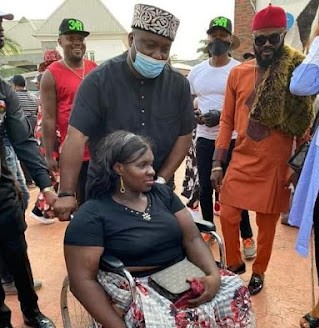Lawrence Nwimo, Awka
There is unease in the camp of persons with disabilities over what they perceive as poor implementation of the Disability Rights Law (DRL) in Anambra State.
Anambra State government in 2018 signed a Disability bill into law to protect the interest of Persons with Disabilities especially in government policies, social development, and welfare.
The state government also established the Disability Rights Commission (DRC) to ensure the protection of PLWDs from harassment and discrimination, inclusion in development, and empowerment for economic liberty.
Five years down the line, PLWDs in the state have reportedly not felt the impact of the law in their daily lives in terms of accessibility, inclusivity, and welfare.
The group during a recent program organised by the Joint National Association of Persons with Disabilities (JONAPWD) Awka, Anambra State capital, still expressed concerns that the Anambra State Disabilities Rights Law (ASDRL) is yet to get the attention needed to scale up its implementation.
According to the group, the Commission set up to ensure the implementation has not been active because of the government’s lack of will, interest, and attention to ensure the implementation of the law in the state.
Speaking at the event, Barr. Peter Moneke of the group, decried that despite the provisions of the law, so many facilities are still no-go areas for persons with disabilities.
According to him, most hospitals, courts, schools, and even hotels have not adhered to the provisions. He also complained that most transporters refuse to carry their members simply because they are living with disabilities.
“As I am talking to you now, nothing has been done to make the public facilities accessible, except the few ones that came courtesy of our advocacy visits.
“The facilities, both public and private, in the state have not complied with the provisions of the law.
“Today, if a person with a disability wants to access the Nnewi North secretariat, it is not possible. The first floor has a hall, but one of us that is working there cannot access that hall. She cannot even go to the chairman’s office, except some persons carry her up to the first floor where the office is located.
“We have the right to access the court. But we are also surprised that despite the good number of courts in Anambra State, PLWDs cannot access many of them.
“For somebody walking with the aid of clutches to climb the staircase of Nnewi High Court is difficult, not to talk of the person in a wheelchair.
“We are the owners of the law, but the question is why are we not benefitting from the law. Are we the cause? Or is it the government is the cause? Is there anybody or familiar spirit or ancestral spirit that has made it that we are not benefiting from the law. The law is like the money we have in our bank account but we cannot have access to it. We cannot have the money and still be hungry.”
Barr Moneke said the law has provided almost everything that will make the lives of the disabled community better, but regretted that the provisions have not been adhered to.
He called on the State government to support the disabilities commission to do its job, noting that the commission needs funding to be able to execute the terms for which it was set up.
“A commission has been set up for this law. We have to ginger the commission to sit-up in ensuring that both the roads, buildings, and all those things mentioned in subsection (3) of the disabilities law are made and adhered to.”
He urged the commission to design building codes and liaise with relevant ministries such that no building plan will be approved unless duly certified to have complied with the law and approved by the commission.
He also said the approach will give room for funding the commission to carry out its activities without depending solely on the government for funds.

